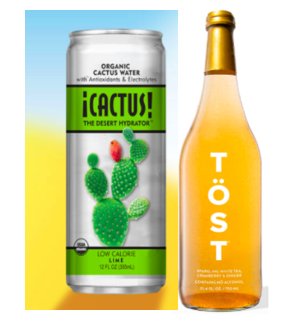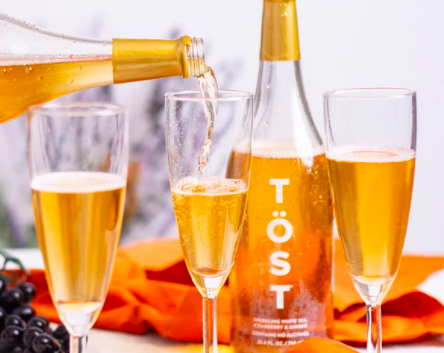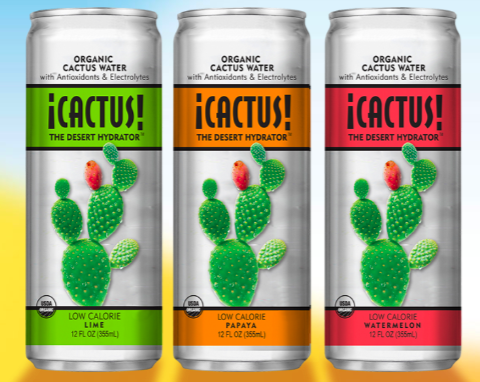New Drinks for the Kosher Table: Sophisticated Looks and Taste with Töst; Healthy Hydration with ¡CACTUS!
By Chef David
As a rule, I find commercial beverages generally lackluster and, therefore, much prefer plain, simple, even dull water. But we all must acknowledge that consumer-buying habits have changed in response to COVID. People are looking for healthier drinks that support immunity and digestive health and contain less sugar without sacrificing taste.
For the kosher consumer, the choices often seem limited to fruit juice, which is packed with sugars; sodas, which I’ve abandoned because of their high-sugar content and empty calories; and flavored seltzers, which are little more than bubbly, lightly-flavored, alternatives to water. For those who don’t drink wine, trying to find a complementary beverage for Yom Tov or Shabbat can be challenging.
Fortunately, I recently had the opportunity to sample two new offerings. I say “fortunately,” because, now deep into winter, we can use more excitement in our meals by exploring new drink options.

Healthier kosher beverages Töst and ¡CACTUS!
Non-Alcoholic Champagne
First, there is Töst, a fizzy, non-alcoholic beverage with a subtle fruity taste. Not too sweet and low in calories (45 per eight-ounce serving), this adult drink, designed to resemble its alcoholic counterparts, comes in a fancy bottle complete with a gold-wrapped screw top. It is intended to serve as a non-alcoholic alternative to champagne, similar in appearance, both in and out of the bottle.
With its sparkling pleasant peachy aroma, all-natural Töst is made from white tea, white cranberry, blue agave, ginger, and citrus extract.
This is more than just a child-friendly alternative to grape juice. In taste and appearance, it would fit proudly on any Shabbos table.

Töst with a subtle fruity taste perfect for your Shabbos table
Hydration Alternative
The next beverage I sampled was very different – ¡CACTUS! It is intended to replenish the body’s natural hydration and, according to its founder, Sarita Lopez, it has many medicinal benefits as well.
A plant-based functional water powered by nopal cactus (sometimes called prickly-pear cactus) leaf juice, which contains a cactus hydrocolloid, Ms. Lopez says ¡CACTUS! boosts hydration, absorption, and retention.
But Ms. Lopez, an organic farmer in California’s Napa region, where juicing cactus paddles (leaves) are grown, says it does much more. “For generations, Latin American folk healers recommended cactus leaf juice for colds, coughs, skin conditions, and stomach ailments,” she says. “Today’s research shows cactus leaf juice may promote muscle recovery, combat oxidative stress linked to inflammation, and may even help reduce the effect of hangovers.” She says it’s also good for clearing acne.
The drink comes in organic lime, papaya, and watermelon favors. An excellent source of vitamin C, which supports immunity, it is low in sugar (5 grams of organic agave in each 12-ounce can contains only 30 calories), which is less than half the calories in some other beverages known for hydration: coconut water (69 calories) and Gatorade (90 calories).
Preparing for Fasts
In the Jewish world, products that help with the body’s need for hydration are especially helpful when preparing for fast days. The popular kosher sports beverages are not especially healthy when their empty calories, sugar content, dextrose, and artificial colors, are considered. In general, these drinks are sources of energy-boosting carbohydrates as well as a balance of potassium, sodium, magnesium, and calcium, all of which help combat dehydration.
I like the concept behind ¡CACTUS! because, when choosing a sports drink, consumers should keep in mind its electrolytes, which improve the body’s ability to absorb fluid and replenish mineral losses; calories, which should match the exercise-level in which the individual will be engaging; and sugar, which replaces the carbohydrates lost during the exercise. Exercisers in general should be aware of potentially harmful artificial sweeteners. Gatorade has about 21 grams of sugar in a 12-ounce serving, coconut water has 9 grams of sugar while ¡CACTUS! contains only 5 grams of sugar, making this functional water a significantly healthier choice.
Having said all that, I admit ¡CACTUS! is not something I would drink for its flavor, which is not easy to describe except to say it might be an acquired taste. I’m still a purist who prefers water as my go-to drink. When planning meals for others, it is refreshing to have more healthy kosher beverage options.

¡CACTUS! a healthy rehydration beverage





